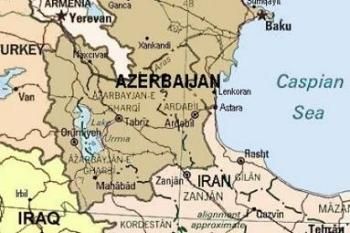
Publisher:
Bonnie King
CONTACT:
Newsroom@Salem-news.com
Advertising:
Adsales@Salem-news.com

~Truth~
~Justice~
~Peace~
TJP
Aug-04-2015 21:30

 TweetFollow @OregonNews
TweetFollow @OregonNews
What Does Israeli Regime Seek in the Caucasus?
Salem-News.com Foreign AffairsTel Aviv's intervention increased in the Caucasus in the late 2000s, when the ministry of foreign affairs established the special departments of Caucasus and Central Asia.
 Map of Azerbijian |
(SALEM, Ore.) - Jewish political tradition is based primarily on a realistic school of thought. Israeli regime has derived its three underlying principles of foreign policy from this school which are: to focus on survival among hostile neighbors, to seek power, and to form alliances.
Israeli regime's foreign policy has also close ties with its longstanding historical traditions.
The Alliance of the periphery or the Periphery Doctrine is one of these traditions which was established in the 1950s. It is a foreign policy strategy that called for Israeli regime to develop close strategic alliances with non-Arab Muslim states in the West Asia to counteract the united opposition of Arab states to the existence of Israeli regime.
It was employed chiefly towards Turkey, and pre-revolutionary Iran. But, the conditions have changed. In Tel Aviv's perspective, Ankara at best is an unfriendly government and Tehran constitutes an inauspicious threat.
In addition, the rise of ISIS and Islamist sentiments have challenged the regime's position in the region.
The Periphery Doctrine which seemed to have been abandoned, is once again on the agenda of the Israeli regime. But this time, it has targeted an area which feels the dynamism of the West Asia, and yet it is able to make use of the geopolitical lever in its northern part: the Caucasus.
Tel Aviv's intervention increased in the Caucasus in the late 2000s, when the ministry of foreign affairs established the special departments of Caucasus and Central Asia. Regime's policy during the relatively short period of "focusing more resources on the region" has gone through two major stages.
The first stage took place before 2008 and focused on Georgia. Israeli regime attempted to train the Georgian army and allowed Israeli private sector companies to equip the military of Georgian with drones and advanced equipment.
After the South Ossetia war in 2008, Zionist regime reduced its visible presence in Georgia in order to avoid provoking the hostility of Moscow. In order to compensate for its reduced presence in Georgia, Tel Aviv expanded its in presence in Azerbaijan.
In the second stage of Israeli regime's intervention in the Caucasus, the trade between the two countries amounted to four billion dollars.
In addition to buying oil from Azerbaijan, Zionist regime has made plans to import twelve billion cubic meters of gas over the next decade, from this Caspian Sea littoral state.
Most importantly, according to the former President of Israeli regime, Shimon Peres, "Azerbaijan is the key to counter the influence of Iran in the Greater Middle East."
The well-known list of the complaints Baku and Tehran have raised against each other includes four major differences: The legal regime of the Caspian Sea; The issue of Nagorno-Karabakh conflict and Iran's pro-Armenian position (according to Azeris); The purported issue of the Iranian Azerbaijan, and the presence of twenty million Azerbaijani citizens in Iran; and the last one is of religious nature: Baku claims that Iran provokes radical sentiments in Azerbaijan, a secular country with a Shiite majority.
Given such circumstances, the Israeli regime, gives a central role to the Republic of Azerbaijan in its strategy of besieging the Islamic republic of Iran.
Despite a number of constraints such as Turkey, anti-Semitism and relations of Azerbaijan with the Palestinians, it is fully embedded in the strategic plans of Tel Aviv to form alliances against Iran (this time with Azerbaijan).
On the other hand, Israeli regime will continue to follow the tradition of supporting the Jewish people of the world. This part of Israeli regime's foreign policy has seriously been pursued in the Caucasus.
According to official statistics in 2012, 3540 Jews lived in Georgia; however, unofficial figures suggest there are eight to twelve thousand Jews in Azerbaijan. The number of Jews in the Republic of Azerbaijan is not clear and varies from nine thousand to sixteen thousand.
In many cases, particularly in Georgia, Jewish citizens have taken up key positions in the government and commercial sectors. This condition can provide a better opportunity for intense political and economic involvement of Israeli regime in the region.
In brief, Zionist regime's interests in the Caucasus have three main dimensions: the Caucasus is strategically serving as a tool to besiege Iran as a regional power.
Besides, in the medium term the Caucasus is seen as a region to supply energy needs of Zionist regime, and in the short term as a market for the sale of advanced arms and ammunition.
These three dimensions, challenge the three traditional actors of the region, namely Russia, Turkey and Iran, which have no desire to see any foreign country to maintain its presence in the region.
 |
Articles for August 3, 2015 | Articles for August 4, 2015 |





Salem-News.com:
Terms of Service | Privacy Policy
All comments and messages are approved by people and self promotional links or unacceptable comments are denied.
[Return to Top]
©2026 Salem-News.com. All opinions expressed in this article are those of the author and do not necessarily reflect those of Salem-News.com.